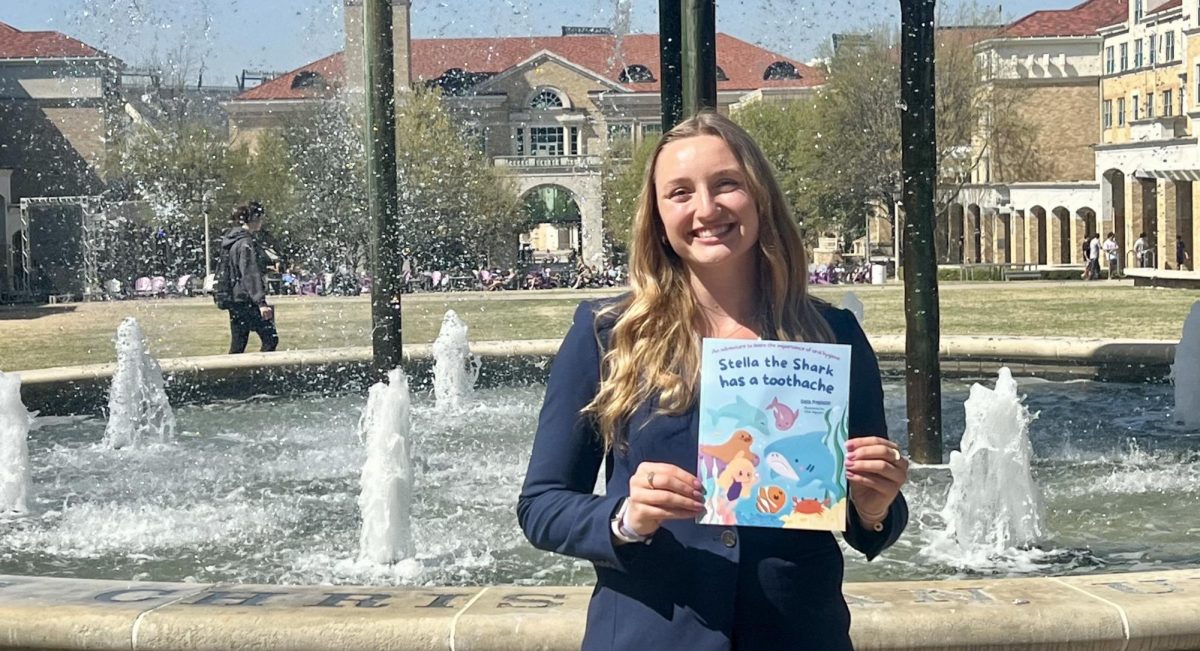Chris Kyle is celebrated for being the most lethal sniper in military history.
But after serving four tours in Iraq, Kyle, like most veterans, found himself back in a civilian world where he had to adjust to a regular, predictable lifestyle after living the chaos and spontaneity of war.
His readjustment was chronicled in his book “American Sniper” and Clint Eastwood’s movie by the same name. Kyle’s widow Taya said his coping mechanisms for dealing with the stresses of war included physical exercise and working with veterans.
The Brite Divinity School would call Kyle’s mental hardships a moral injury, or an attack of consciousness after violating one’s sense of right or wrong. Brite provides the Soul Repair Program to help veterans, like Kyle, and their families cope with recovery from the traumas of war through the pursuit of faith.
Rita Brock, head of the Soul Repair Program, said its mission is to educate the civilian society about how to work with returning veterans and understand what they experienced.
“If you are a normal person, and you go to war you will not come back the same,” Brock said.
According to a study done by the RAND Corporation and the Veterans Administration, out of the 2.7 million Iraq and Afghanistan veterans, 20 percent suffered from post traumatic stress disorder or depression. Of that percentage, only half sought treatment.
This can be compared to the 4 percent that suffer from PTSD out of the American population of 316.9 million.
Brock said we expect so much from our armed services, but once they return we hardly do anything to help them reintegrate into a healthy lifestyle.
A Grim Transition
The top box office hit “American Sniper” portrays Kyle’s invincible war record and genuine patriotism, but the underlying message is focused on the mental and physical disorders Kyle, along with many veterans, has to endure once returning.
The transition can be extremely difficult for veterans.
“It’s a cognitive itch,” said veteran Daniel Charles who works with the Soul Repair program. “What is normal after you have experienced life or death situations?”
Taya Kyle said her husband’s changes in behavior were slight, but easy to pick out. His actions were more animated and protective.
“When he was overseas and his blood pressure was going through the roof and physically, the effects were undeniable, we knew there was more than just the distance causing his internal pain,” Taya Kyle said.
Kyle is credited with 160 confirmed kills.
Brock explained that snipers are more deeply affected after a kill. They are trained to stalk their targets and learn their lifestyles to be able to configure the perfect shot. Most military personnel close their eyes after they pull the trigger to try and save their moral dignity, but snipers cannot afford to do the same, she said.
“Snipers have to watch their kill to make sure they complete the task and this really bonds them,” Brock said.
The paradox of war
The armed services teaches strong morals of courage, patriotism, modesty and commitment. Brock said that war is the ultimate destroyer of these morals and this is the paradox of war.
“In life you are taught you are not supposed to kill women, children or anyone really, but when they have a grenade and you’re at war, there is no good or right answer,” said Brock, whose father fought in Vietnam and inspired her to help recovering veterans.
Thanking military service men and women for their service can appear contradictory for veterans. Celebrating the murder of thousands of people can be difficult to understand when one is actually witnessing the unrest.
“People have morals,” Charles said. “Soldiers are humans too and they cannot just ignore the guilt of pulling that trigger no matter who is in front of it.”
While Americans show their pride with parades and memorial services for veterans, Charles said what they really need is someone to ask if they are okay rather than just a thank you.
Marine Lance Cpl. James Blake Miller is featured in the documentary “The Marlboro Marine” by Los Angeles Times photojournalist Luis Sinco. The narrated photo slideshow tells the story of Miller’s struggles readapting to life in the United States after serving in Iraq.
“Most people want to help a returned vet by celebrating them coming home. The question that needs to be asked instead of ‘can I throw you a party’ or ‘can I buy you a beer’ is ‘hey how are you doing, how are you feeling, is there anything I can do to help?’” Miller said in the 2007 documentary.
Moral Injury and Soul Repair
In her book, “Soul Repair: Recovering from Moral Injury after War,” Brock wrote that “Although veterans make up only 7 percent of the U.S. population, they account for an alarming 20 percent of all suicides.”
Brock said many veterans try to sustain the adrenaline rush they received while on tour by abusing drugs, alcohol or engaging in violence.
The most difficult aspect is trying to get veterans to talk about their feelings for therapeutic release. Many are ashamed of their stories or do not want to corrupt others, especially their family, with what they had witnessed.
“Once they try and register with Veteran Affairs for PTSD, it is too late because they are so in crisis,” Brock said. “No one can prepare you for the inhumanity of war and it’s even more difficult to get veterans to forgive themselves after.”
The Soul Repair program brainstorms strategies for veterans to recover from their grief and to educate the general public about what veterans are dealing with and how they can help.
The program focuses on deep-listening to create a place where veterans can become comfortable sharing their stories.
Brock explained her current research agenda to create a reverse boot camp to reintegrate veterans back into society to avoid potential mental disruptions and rebuild moral identity.
“When a society sends people off to war, it must accept responsibility for returning them home to peace,” Brock said.
Brock said the ultimate goal is to make this decompression program required for all veterans returning from combat.
The Inability to Escape
Veterans all have different ways for dealing with their disorder.
Brock said Kyle made a military cocoon to help himself. “He put himself in a paramilitary environment and I think it exhausted him.”
Kyle was an active volunteer at the VA. Although he was not a trained clinician, Kyle worked with veterans often. Taya Kyle said remaining in a fast paced military environment comforted Kyle.
However, Brock said this is not the best strategy for veterans recovering from serious mental disorders like PTSD or depression.
The morning of Feb. 6, 2013, Kyle took a troubled veteran to a shooting range to try and help. Kyle recognized the veteran’s erratic behavior, but proceeded to work with him. The veteran, Eddie Ray Routh, shot and killed Kyle along with Kyle’s friend at Rough Creek Ranch Lodge in Erath County, Texas.
Routh was found guilty of capital murder and sentenced to life in prison.
Brock said situations like this are society’s fault for making it so difficult for veterans to come back to a normal lifestyle and clearly process everything that had happened.
Accuracy of “American Sniper”
While “American Sniper” captured the attention of millions of Americans, Taya Kyle said it was difficult to incorporate all the important moments in a two-hour film.
Charles said the portrayal of Kyle’s internal struggles were accurately portrayed but he wishes the movie focused more on the pain veterans must deal with on a daily basis.
“For me it was not entertainment,” Charles said. “But it is an important movie for every American to see.”
Taya Kyle said the movie is very accurate but some scenes had an added Hollywood touch.
“For example, he didn’t punch the window in the hospital, but he did have very passionate, protective and perhaps more exuberant moments where he wanted to protect the kids perhaps more strongly than he would have if he had not been at war,” Taya Kyle said explaining a scene in the movie when Chris was disturbed watching his new born child crying in the hospital nursery.
Although Taya Kyle said she would not make any edits to the movie, there are certainly moments she wishes were included.
“If there were time, I would have showed more of the fun, the laughter and the deeply important loving moments between Chris and me,” said Taya Kyle who was married to Kyle for 11 years. “But, it wouldn’t have changed the movie in any way to make it better. It’s just a part of my life that I loved.”
Honoring the Frog
A frog is the symbol for a fallen Navy SEAL. A skeleton frog with a red cross was tattooed on Kyle’s left shoulder and became the basis for the ‘Chris Kyle Frog Foundation’ which was created in his memory.
The 501c3 non-profit has a similar goal to Brite’s Soul Repair program to help reintegrate veterans into society. However, the Chris Kyle Frog Foundation focuses on helping veterans reconnect with their families.
“We are enhancing the bond and helping couples through the pain and struggles that fighting evil brings into the marriages,” said Taya Kyle who is the driving force behind the foundation. “Those who fight will do better with love and support from their spouse. The spouses need support too.”
Taya Kyle explained how Chris Kyle’s change in behavior upon returning deeply affected her family life. She said Kyle was continuously trying to improve himself but she suffered through sleepless nights feeling helpless.
“Chris was strong and had the heart of a lion, he fought through it all valiantly and tirelessly,” she said.






